- Home
- Dandi Daley Mackall
The Secrets of Tree Taylor Page 11
The Secrets of Tree Taylor Read online
Page 11
But Eileen wasn’t with him tonight. And Laura the Lifeguard was.
“Yeah,” Jack said. “About that—”
“What’s he doing with Laura?” I demanded.
“Dancing. They come here and dance. That’s all.”
“Why didn’t he bring Eileen?”
“Tree,” Jack said, “I love your sister. You know that. But … well … have you seen her dance?”
He had a point. Still … “So that’s it? They dance. But where do they go after they dance?”
“You’d have to ask them about that. But don’t do it here. Here is for dancing.”
Suddenly, “Heat Wave” shouted at us from every car. I loved that song.
Jack hopped out of Fred and reached in for me. “Come on, Tree! You love Martha and the Vandellas.”
I stayed where I was. “Yeah. But not with all these people around.”
“So pretend they’re not. We’re missing it, Tree!”
I thought for a minute and figured I’d already made a fool of myself by showing up here. I might as well enjoy it. I slid out and ran into the dancing ring while Martha belted out: “… like a heat wave, burning in my heart. I can’t keep from crying, tearing me apart.”
A few voices shouted something to Jack, but I shut them out. There was nothing but the music now. Now was for dancing.
Jack took both of my hands, and, like we’d done on umpteen Sunday nights, we danced. I got into it so deep—spinning, bridging, underarm turning—I didn’t even notice another dancer until the song ended.
When I looked up, Jack and I were standing in the center of the circle, and I was shoeless. Nobody else was dancing. My heart pounded, but not from dancing. I knew they were going to tell me to leave. I was too young. I didn’t belong here.
Then somebody clapped.
And before we knew it, cheers burst out all around the circle. Hoots and hollers and applause. Even Kent. Especially Kent. “Take a bow, cats! You weren’t kidding about Tree dancing us into the ground, were you, old man!”
Several of the girls—not Laura—rushed up to me.
“Tree, that was so cool!”
“Far-out, girl!”
“Was that the watusi you did at the end?”
Before I could get a word in, Suzi exclaimed, “You have to teach me how you do that thing when you spin under and come up swinging!” Suzi was Hamilton’s homecoming queen.
“Where did you learn to dance like that?” Liz asked.
Before I could answer—and I wouldn’t have had a clue how to answer—another song started, and Jack whisked me away.
Then another. And another.
Jack wouldn’t let anybody else dance with me. Only him. Which was fine with me. We danced every song as if we were on American Bandstand. Meanwhile, lightning bugs flashed all around us, and stars shone overhead. A train wailed in the distance. I could smell grass, and water, and perfume.
Jack and I twisted. We did the mashed potato. We jived and jitterbugged. I’d never gotten so much applause in my whole life. Even Eileen hadn’t gotten this much when she did piano recitals.
“Wipe Out” came on, and I was dancing by the first note.
Not Jack. “Tree, it’s late. I’d better get you home before your dad sends Officer Duper out looking for us.”
“No! I love this song, Jack!” I was so jazzed I could have danced on the reservoir.
But he was already halfway to the car.
I hated leaving, but I followed him.
Instead of heading back by the spillway, we took a different road out, past the main reservoir. It would have made a fine lake if we hadn’t needed to drink it.
“Right over there.” He pointed to a worn path near the water’s edge.
It reminded me of pull-over spots on highways so drivers could stop and get a good view or take pictures. It was a pretty spot, but no better than anywhere else around the water. “So what’s down there?” I said.
“That, my dear Tree, is a place you should never let those young rascals in your class take you once they get their licenses.”
“Why not?” I pictured water moccasins looming over the edge.
“Because that’s where some people go to watch submarine races.”
“Submarine races? Right. Like they’re ever going to see a submarine.”
“Exactly. So don’t let anybody take you there looking for any. Got it?”
“Ah.” Suddenly, I did get it. I knew about making out, and “going all the way,” at least in theory.
“What time is it anyway?” I asked, changing the subject and settling safely into the suicide seat.
“After eleven.”
“You’re kidding!”
“When’s your curfew?”
Good question. I didn’t actually have a curfew. I’d never needed one. Eileen was supposed to be in by ten on weekdays, eleven on weekends. “I’m going to be in trouble, aren’t I?” Again.
“Sorry, Tree.”
I shook my head, reliving the sensation of dancing in the headlights, while stars floated their shapes above us. “Don’t be sorry. Whatever they do to me, tonight was worth it.”
The porch light shone as we drove up to my house. Giant moths flopped against the glass dome.
“Want me to go in with you?” Jack offered.
“I think it will go better if I face the music alone.” I grinned, knowing he’d get the music line. “Thanks, Jack.”
He drove off, and I took a deep breath before going on in. I opened the front door, expecting my parents to be waiting there, arms crossed, lecture at the ready.
Midge rushed up to me. She jumped on me, like she’d been worried.
Apparently, she was the only one.
Half-expecting a trap, I checked the kitchen blackboard, where we left notes for each other. I had to flip on the light to read it:
TREE —
WE POOPED OUT EARLY. TURN OFF THE PORCH LIGHT.
LOVE, MOM
Unbelievable.
I wasn’t quite sure how I felt about being so ultra-trustworthy, with such worry-free parents. I got ready for bed, then cuddled up with Midge. I closed my eyes and let the headlight circle take over my mind. Music still played in my head, and my insides danced as I lay still, remembering, tasting the night again, the way the breeze stirred laughter and music. Words broke through my night-dream like unwanted car commercials on station WHB—suicide seat, riding shotgun. Then the music exploded back, bringing with it streamers of fireflies and stardust.
I fell asleep as visions of the reservoir danced in my head, with only the shadow of a water moccasin swimming below.
23
Nowheresville
Thursday was supposed to be Dad’s day off, although he usually ended up going into the office half a day. Some Thursdays he and Mom went to Kansas City shopping. But that morning I’d heard them talk about visiting Mr. Kinney in the hospital.
That gave me an idea. Maybe I could write a better article if I talked to Mr. Kinney instead of Mrs. Kinney. I’d had more than a couple of false starts trying to write about Mrs. Kinney. Whenever I tried to record my conversations with her, I’d start thinking about the real person, the way her eyes sparked when she cracked open her door and saw it was me. And I didn’t really want to write anything that could take away that spark.
But Mr. Kinney was a different story. If I could talk to him, maybe he’d spill everything about what had really happened, all the details about the shooting. I could still deliver the truth of it to Randy, and I wouldn’t have to get it out of Mrs. Kinney.
I put on a green dress that only a mother would love. And since it was my mother who loved it, I thought it might help my case. When they came out in their dressed-up clothes, I was waiting. “I’m ready,” I informed Mom.
Mom looked too good for a hospital. She wore a pillbox hat, like Jackie Kennedy, a straight black skirt, and a short jacket with fake diamond buttons. “Ready for what?”
“To go to the hospi
tal. To see Mr. Kinney.”
“I don’t think that’s such a good idea,” Mom said.
“How come?”
Eileen must have heard us from the kitchen. She left her studies to join our discussion. “Why would you want to go to the hospital and hang out with sick people? Gross.” She shuddered.
“Really, Nurse Eileen? Better hope none of your patients are sick, then.”
“You don’t even know Mr. Kinney, do you, Tree?” Mom asked.
“He is our neighbor.”
Dad had been trying to tie his tie in the hall mirror. Mom walked up to him and took over the tie tying. He frowned over his shoulder at me, and I knew he’d seen through my bogus request. “You’re not coming, Tree. And that’s that.”
That was that. I’d gotten dressed for nothing. And my best chance of observing Mr. Kinney close-up? Gone with the wind.
The minute Mom and Dad closed the door behind them, I tried calling the sheriff’s office again. Maybe he’d have Mr. Kinney’s story by now. Mrs. Berger informed me that Officer Duper could be found at the railroad tracks reclaiming his parking sign. I could tell she was laughing.
I changed clothes, and for the rest of the morning, while Mom and Dad were at the hospital, and while Eileen memorized the digestive system, I wrote.
The quote for the day was pretty neat:
In my beginning is my end.—T. S. Eliot
I wasn’t sure I understood it, but I turned to a clean page in my notebook and started over. This time, I discovered that the hardest part was not making things up. Like I’d talked to two women who volunteered in the church nursery with Sarah and me, and they told me stuff about Lois Dodge before she got married. Only I couldn’t remember their exact words, and I didn’t want to make anything up. And when I tried to record my DeShon interview, I could have guessed which DeShon boy said what. But the truth was, I couldn’t tell those boys apart. I wondered if real newspaper people had the same problem.
The rain kept coming off and on, and the pool stayed closed. D.J. and Sarah both called and told me to knock off the rain dances. Sarah reported that her mother hadn’t started sewing her costume for the steam engine show yet—she was too busy with the yard sale. While emptying junk from the attic, Sarah had found a bonnet in an old trunk. She sounded as stir-crazy as I felt.
I got so desperate, I phoned Penny. Her sister answered and hollered for Penny to come to the phone. I heard two clicks and figured they were on a party line, which meant that several houses shared the line and any of them could listen in.
“Hello?” Penny sounded scared, even on the phone.
“Hi, Penny. This is Tree.”
“I know.”
This wasn’t going to be easy. Sarah and I could talk forever without thinking about it. “So, what are you up to on this rainy day?”
“Reading.”
“Yeah? Cool. What are you reading?”
“Fahrenheit 451. I know we read it in school, but I’m rereading it.”
“Great book.”
The line went silent, except for a cough that didn’t come from either of us.
“Okay, then.” I couldn’t think of a single thing to say. “So, see you later?”
“Okay. Bye.”
That afternoon I visited Mrs. Kinney again. We had a little routine going. She grinned, and I grinned back as she opened the door. We took our appointed seats, and I checked out how her baskets were coming along.
“Your mama called to ask if I wanted to visit Alfred in the hospital,” she said, getting up from her chair. “As you see, I declined.”
“How come?”
“Don’t reckon I’ll be seeing Alfred again.” There was not a note of regret in her voice. I thought of Jack’s word, “relieved.” She sounded relieved.
This was the perfect opening for me to hit her with the hard questions Randy would have wanted answered. Did Alfred say he’d never see her again? Or was she the one who said it? And what about that gun in her arms on the porch that morning?
She came out with my hot chocolate. I took a sip and set it on the rickety table. She’d sprinkled nutmeg on the whipped cream. “Thanks. I love nutmeg on top.”
She sipped her chocolate. “Nutmeg is poisonous if you give it in a shot. But it’s just right on whipped cream on a rainy day.”
Then, before I could ask her about Alfred, she was sharing weird facts about Wyoming (she’d always wanted to see a rodeo), France (she’d dreamed about seeing the Mona Lisa painting), and Yosemite Falls in California, the highest waterfall in the U.S. (she’d dreamed of going over it in a barrel). “I love big bodies of water.” Her eyes narrowed as if she could see the ocean from her rocker.
“You should come to the pool … if it ever stops raining,” I said. “It’s just a small body of water, but it’s pretty when the sun hits it … if the sun ever shines again.”
“Can’t swim a lick.”
“Lots of people who come to the pool can’t swim.”
“That so?”
I’d been thinking about Wanda when I told Mrs. Kinney about nonswimmers coming to the pool.
“Anybody in particular you’d be thinking of, a non-swimming person?” Her tiny eyes stayed fixed on me.
“Wanda,” I admitted. “She’s my age. And she wears a bikini.”
“That why this Wanda comes to the pool, you reckon?” Mrs. Kinney asked. “So’s she can show off that there bikini?”
I shrugged. “Maybe. I think she comes because she hopes Ray will be there.”
“Ah. This Ray—you reckon he comes for the same reason? Hoping Wanda will be there?”
“No!” I answered too fast. And too loud. “I mean, I don’t think so. She’s the one chasing after him. I don’t think it’s the other way around at all.”
“You reckon this Ray fella’s got more sense than to go for a gal who can’t rightly swim?”
“I do. I think he’s got a whole lot more sense than that.”
Mrs. Kinney frowned, like she was taking in this information. Then she nodded, slowly. “I’ll bet you’re a good swimmer,” she said.
“Not bad.”
We finished our hot chocolate. I hadn’t meant to talk to Mrs. Kinney about Wanda. Or Ray. I didn’t think she’d tell anybody what I’d told her, though. Only that made me wonder if she felt the same way. Did she trust me not to tell anybody what she told me? Not that she’d told me much of anything so far.
Mrs. Kinney carried our cups and saucers into the kitchen. When she sat down again, she launched into facts about swimming and countries that held the Olympics.
I asked her half a dozen questions about the Olympics. But I just couldn’t bring myself to ask a single question about Mr. Kinney or that gun.
24
Unreal
On Friday when the sun finally came out, I couldn’t wait to go back to work. I got ready earlier than I needed to and dressed in my green swimsuit, with white shorts. My quote for the day was one I got out of a school library book of quotations:
Next to doing things that deserve to be written, nothing gets a man more credit, or gives him more pleasure than to write things that deserve to be read.—Lord Chesterfield
I wasn’t so sure the quotation had anything to do with me. I couldn’t claim to be getting pleasure out of writing about the Kinneys. But I’d promised Randy I’d hand over an article at the steam engine show, July Fourth. And pleasure or not, I would. I settled into my writing chair by the picture window. Something crinkled in my pocket—a note. I knew I hadn’t put it there. My “anonymous” note writer could have stuck the note into my pocket when my shorts were in my pool basket. Or Jack could have done it Sunday.
The message was typed.
I may sometimes differ in opinion from some of my friends, from those whose views are as pure and sound as my own. I censure none, but do homage to every one’s right of opinion.
—Thomas Jefferson
I tried to connect Jefferson’s words to my writing. Maybe he—and Jack
—meant that if I ended up writing something people disagreed with, it would be okay. I had a right to my own opinion.
I wished Dad would read the quote.
In a stroke of brilliance, I copied Jefferson’s words into my notebook, then left Jack’s note out on the coffee table in hopes that Dad would read it.
Plopping back into my writer’s chair, I heard another crinkle. After checking my remaining pockets, sure enough, I found another note:
Believe nothing against another, but upon good authority; nor report what may hurt another, unless it be a greater hurt to others to conceal it.
—William Penn
After rereading the note, I decided it was saying I shouldn’t gossip. But it made me think about the Kinney article I’d promised Randy. William Penn was like Randy’s dad. Neither of them wanted to report anything that might hurt another person, unless they had to. I guess that’s how I was starting to feel about Mrs. Kinney.
By then, the whole house had started getting ready. While I scribbled in my notebook, I got the feeling Dad was watching me. He ran his electric shaver over his morning stubble like always, sitting on the floor of the narrow hallway, so we had to step over him. With his back to the wall, his feet drawn under him, knees high, he had a clear view of everything that went on in our house.
I fought hard not to make eye contact with Dad. I did not want him to ask me what I was working on. I didn’t know if he knew I’d been talking to Mrs. Kinney, but I doubted Hamilton kept many secrets from Doc Taylor.
I had always loved the hum of the razor as it moved up and down Dad’s cheeks and over his chin. He claimed he shaved in the hall because long ago he’d given up on getting a decent turn in the bathroom. True, even that morning Mom and Eileen were vying for the shower. But I believed Dad shaved in the hall because he’d found the perfect spot to spy on us.
Finally, he clicked off the razor and pulled out a bottle of Aqua Velva from his dopp kit. He poured some of the liquid into one hand, rubbed his palms together, then slapped his cheeks. The scent of minty aftershave filled the living room. It was what blue would smell like if blue had a smell. It made me think of Ray Miller’s eyes.

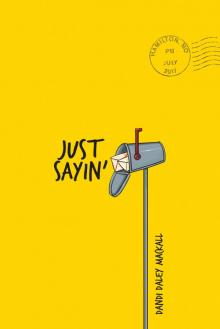 Just Sayin'
Just Sayin'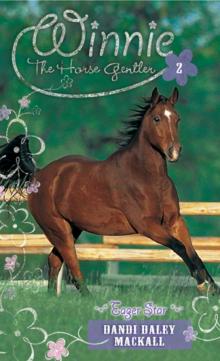 Eager Star
Eager Star Gift Horse
Gift Horse Cowboy Colt
Cowboy Colt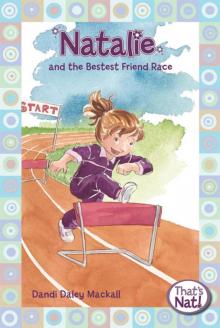 Natalie and the Bestest Friend Race
Natalie and the Bestest Friend Race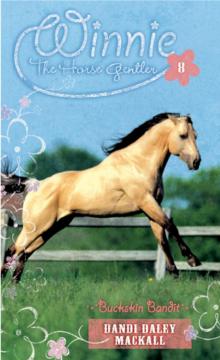 Buckskin Bandit
Buckskin Bandit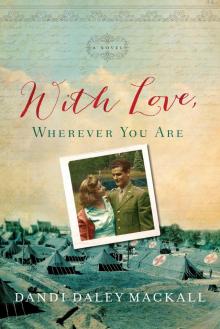 With Love, Wherever You Are
With Love, Wherever You Are Runaway
Runaway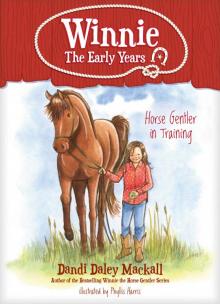 Horse Gentler in Training
Horse Gentler in Training Crazy in Love
Crazy in Love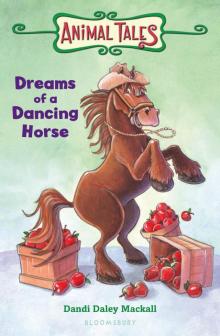 Dreams of a Dancing Horse
Dreams of a Dancing Horse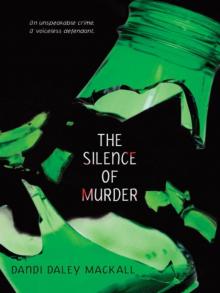 The Silence of Murder
The Silence of Murder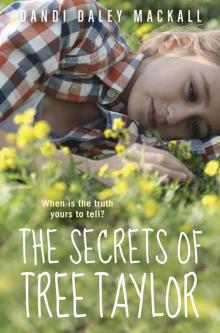 The Secrets of Tree Taylor
The Secrets of Tree Taylor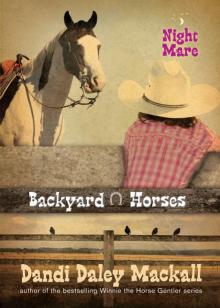 Night Mare
Night Mare Natalie Wants a Puppy
Natalie Wants a Puppy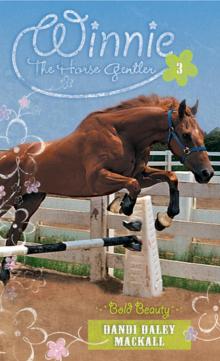 Bold Beauty
Bold Beauty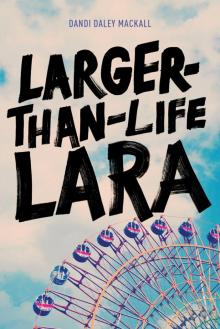 Larger-Than-Life Lara
Larger-Than-Life Lara My Boyfriends' Dogs
My Boyfriends' Dogs Dark Horse
Dark Horse Horse Dreams
Horse Dreams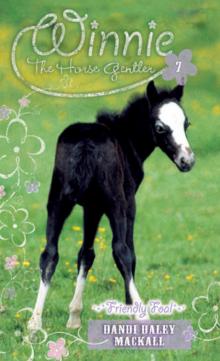 Friendly Foal
Friendly Foal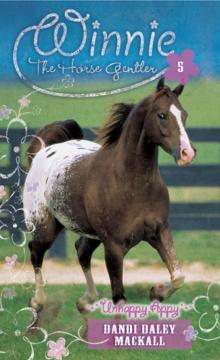 Unhappy Appy
Unhappy Appy Mad Dog
Mad Dog A Horse's Best Friend
A Horse's Best Friend